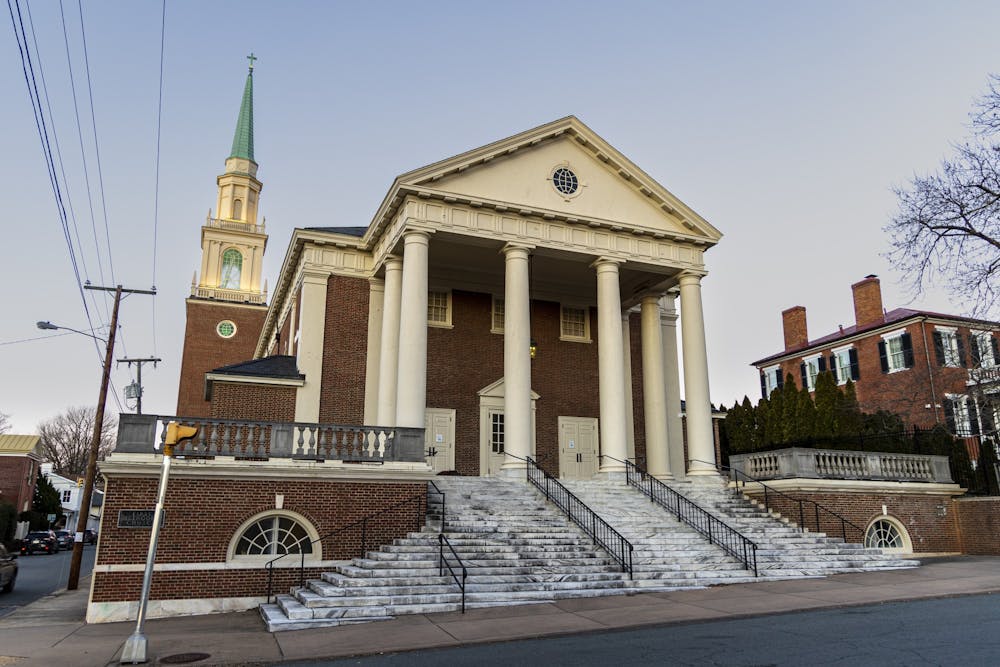Here in Charlottesville, the fight against climate change has recently faced a setback. At the last meeting of the Charlottesville Board of Architectural Review Jan. 18, the committee voted four to three to deny a request to install solar panels by First United Methodist Church. The solar panels, the church said, would save them a great deal of money, as “electrical costs would be reduced by approximately 50 percent at a savings of about $11,000 per year” — they’d also be invisible, ensuring the historic charm of the church would remain intact. The decision to deny First United Methodist Church their solar panels is a mistake that highlights shortcomings in the city’s regulatory guidelines. In order to encourage a greener Charlottesville, approving this measure is the best path forward.
Built in 1923, the First United Methodist Church is a colonial revival building with a long history in Charlottesville.The City of Charlottesville places a great emphasis on architectural preservation when it comes to historic buildings, and it has every reason to do so. With this in mind, the city’s architectural history can and should be respected, yet it can do while also promoting sustainability.
The BAR is responsible for addressing both preservation and design issues within Charlottesville’s architectural design control districts. First United Methodist Church sits in the Downtown Architectural Design Control District, where preserving the architecture of the late 19th and early 20th century that marks the area is of the utmost importance in the eyes of the City. That being said, preservation efforts can — and should — be coupled with clean energy efforts.
The debacle originally began in October of last year when the BAR initially rejected the church’s request for solar panels by a vote of four to two. Solar power is a recommended step in helping the city achieve a lower carbon footprint per Charlottesville’s comprehensive plan — notably, the City emphasizes these measures are aimed towards residential and municipal buildings. The BAR’s design guidelines follow in the same vein, arguing that green energy is not a necessity for historic buildings. Given much of Charlottesville’s architecture is historic in nature, these regulatory guidelines aren’t conducive to the establishment of green energy infrastructure — making it difficult for the city to ever achieve a more sustainable carbon footprint.
While there is an importance to having historic building standards to preserve architecture and its significance to the community, this is not a case of radical change happening to the Church building — the cost of progress is a few sections of slate roofing. In fact, the solar panels themselves would not be noticeable except from a great distance or an aerial view. This proposal is instead a valiant attempt to promote sustainability in a way that will be beneficial to the community by “demonstrating good stewardship of the environment.” Moreover, the church’s multiple requests and expressed disappointment shows just how much this change means to them and their members. Letting the current architectural guidelines get in the way of a plan that will help reduce our city’s carbon footprint, while still respecting the importance of ongoing preservation efforts, is a serious mistake.
We are facing a climate crisis unlike anything humanity has ever experienced. According to the New York Times, the past eight years have been the hottest on record, and without a significant change in CO2 emissions it does not show any sign of stopping. While First United Methodist Church may be a small blip in the grand scale of human influence on climate change, every action counts and failure to act has severe consequences. Furthermore, as a pillar of a community, an organization such as a church plays an important role in guiding the lives of its parishioners and shaping their values. If a church like First United Methodist were to install solar panels, it would both send a climate-conscious message to those who attend and those in the community at large. It would also represent a step forward for green energy in Charlottesville, as First United Methodist would join other organizations like the Charlottesville Climate Collaborative in showing just what the city has to offer in regards to renewables. With so much at stake due to climate change, we must all stand united in our fight to bring about a greener future.
Ryan Lanford is an Opinion Columnist who writes about politics for The Cavalier Daily. They can be reached at opinion@cavalierdaily.com.
The opinions expressed in this column are not necessarily those of The Cavalier Daily. Columns represent the views of the authors alone.







